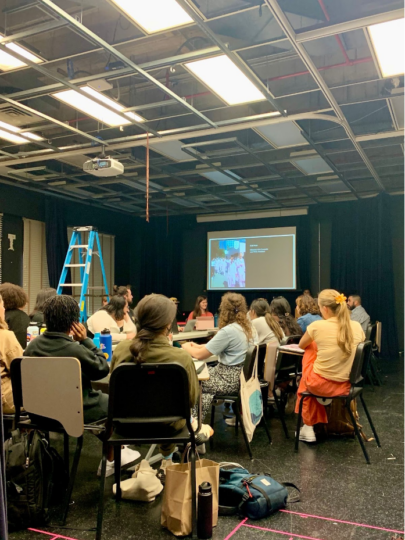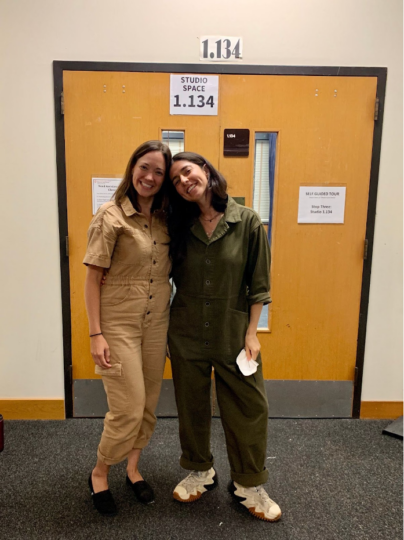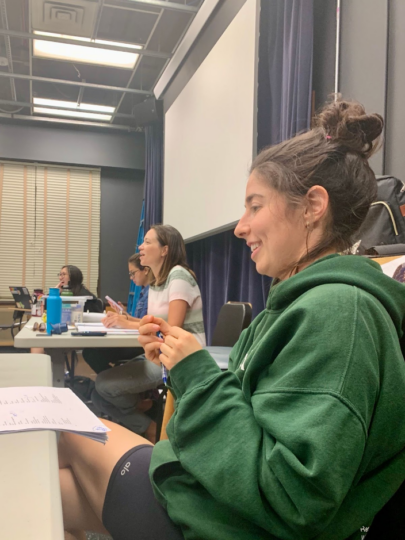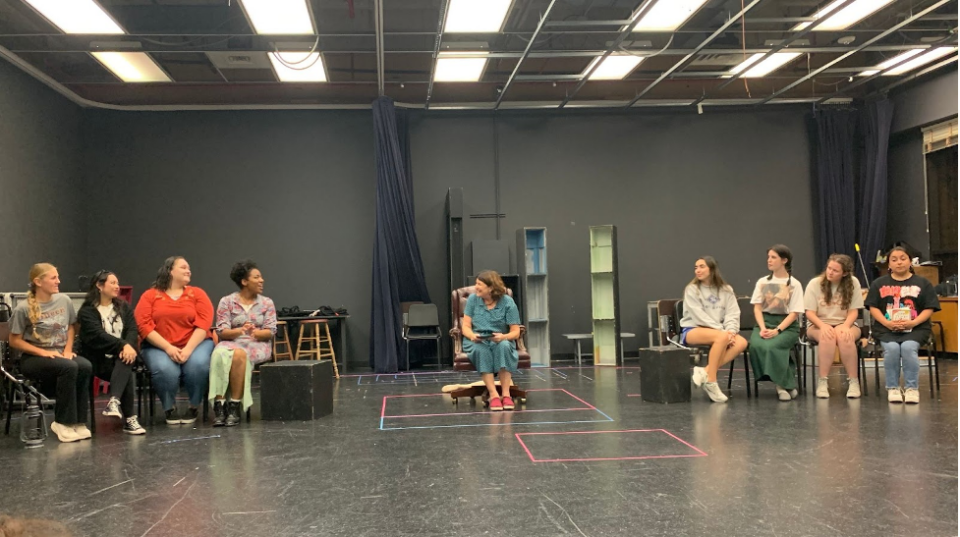Dramaturg and current M.A. candidate Rebecca Fitton provides a behind-the-scenes look at rehearsals for In Sisters We Trust, or My F*cked Up American Girl Doll Play –
Rebecca Fitton: Justine Gelfman’s sharp, witty and all too timely play, In Sisters We Trust, or My F*cked Up American Girl Doll Play, offers a nuanced critique of institution-branded female empowerment. The story leans first upon nostalgia–the surreal magic of American Girl–before plummeting into the complex dynamics of historical discrimination and erasure as related to race and gender, generational wealth, intersectional feminism and flawed representations of women in media. It is a doozy. The play implicates you, the audience, in its commentary. How are you complicit in age-old oppressive practices glossed over by a shade of millennial pink?
Quick, find your seats on the carousel… the ride is about to start!
When director, Jenny Lavery, first approached me about supporting In Sisters We Trust as a dramaturg, I balked. My background as an artist and scholar is in contemporary, experimental dance and public policy. Can I support a play, the actors, the playwright and the director? Yet here I am, six months later, sharing my insights on the creative journey and its key contributors.
Many voices support this production. The work would not be as vibrant as it is without the labor of the undergraduate and graduate students, faculty and staff at the play’s artistic core. As Jenny said on the first day, “theatre is a team sport.” Now you are joining our game, get ready for the ride…

let’s meet our girls
i mean women
i love women!
—
First, Jenny’s skill as a director should be celebrated. She compiled a dynamic group of co-conspirators to bring Justine’s sharp, funny and expansive play to life. Her feminist approach to directing prioritizes community care, collaboration and radical respect. From the first rehearsal in September, the energy among those gathered was palpable.
A timely resurgence of American Girls nostalgia this summer buoys Justine’s bold, quick-witted writing. But the renewed interest is not in the $115 18-inch dolls instead, it is through memes. Actually, I do want an American Girl Doll “who is 27 years old, has no money, no prospects and is frightened.” No? Just me?
Then, during the first week of rehearsals, the pillar of female-only co-working spaces, The Wing, shuttered its doors after five years of business, a discrimination lawsuit, the departure of its infamous CEO and public complaints about poor working conditions from previous employees. It is not lost on those involved that the lively cultural commentary about institutions like American Girl and The Wing is an absurdly perfect background for this play’s premiere. I encourage you to notice in the play how both institutions fail to support the individuals they try to celebrate. What are the repercussions?

A dramaturg’s role in a rehearsal room can be nebulous. For this process, I served as a witness. I watched rehearsals from the sidelines– noted Jenny’s leadership, Justine’s care for the characters, the assistant director’s vibrant contributions, the stage managers’ steadfast attention and the cast’s trust, bravery and joy. As one of many who do not make it onstage, it is important to me to share the names of those who work behind-the-scenes and bring a show to light. What you witness during In Sisters We Trust is the collective work of Meagan Beattie (Costume Designer), Sarah Jean Elliott (Lighting Designer), Rebecca Fitton (Dramaturg), Clarissa Garcia (Stage Manager), Daniel Geld (Technical Director), Justine Gelfman (Playwright), Andy Grapko (Intimacy Director), Inji Ha (Scenic Designer), Jason Lee Huerta (Technical Director), Jenny Lavery (Director), Elias Merlo (Associate Sound Designer), Tobie Minor (Fight Director), Benjamin Randall (Projection Designer) and Peter Stopschinski (Sound Designer and Composer).

The labor of women and femme folks across history is largely under-recognized and unnamed, especially when individuals hold intersectional identities. Our stories often do not reach history books. Instead, our voices and experiences are passed down through communities and personal relationships. My goal in this process is to counteract the historical record. I aim to make visible the previously invisible, to celebrate the work of a majority femme group and to acknowledge the value of theatre that honors and rights historic patterns of systemic injustice.
Felicity, Josefina, Kirsten, Addy, Samantha, Kit, Molly, Kaya, Harmony and Joaquin.
Grace, Aerin, Stefanie, Jordan, Maude, Jemma, Lulu, Maggie, Elder Member and Bob.
And the actors portraying these characters – Ava, Chantell, Angela, Mack, Ashley, Keeley, Grace, Maddie, Barbara and Simon – who breathe life into the play.
The rigor of bringing a production to life is substantial. This cast does not hold back. They cherish challenging conversations, finish each other’s sentences and find the collective grit that brings In Sisters We Trust to life. The camaraderie between actors in a show is dynamic– but this cast holds your feet to the fire, demands answers and continually asks you to show up for them when they speak. I hope you listen and remember…
“The surest way to keep a problem from being solved is to deny that problem exists.”
– Sarah Kendzior

In Sisters We Trust, of My F*cked Up American Girl Doll Play
October 20-29, 2022.
B. Iden Payne Theatre
TICKETS
Written by guest blog contributor and M.A. in Theatre candidate Rebecca Fitton.

